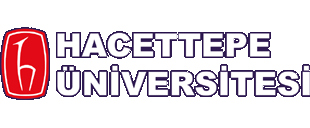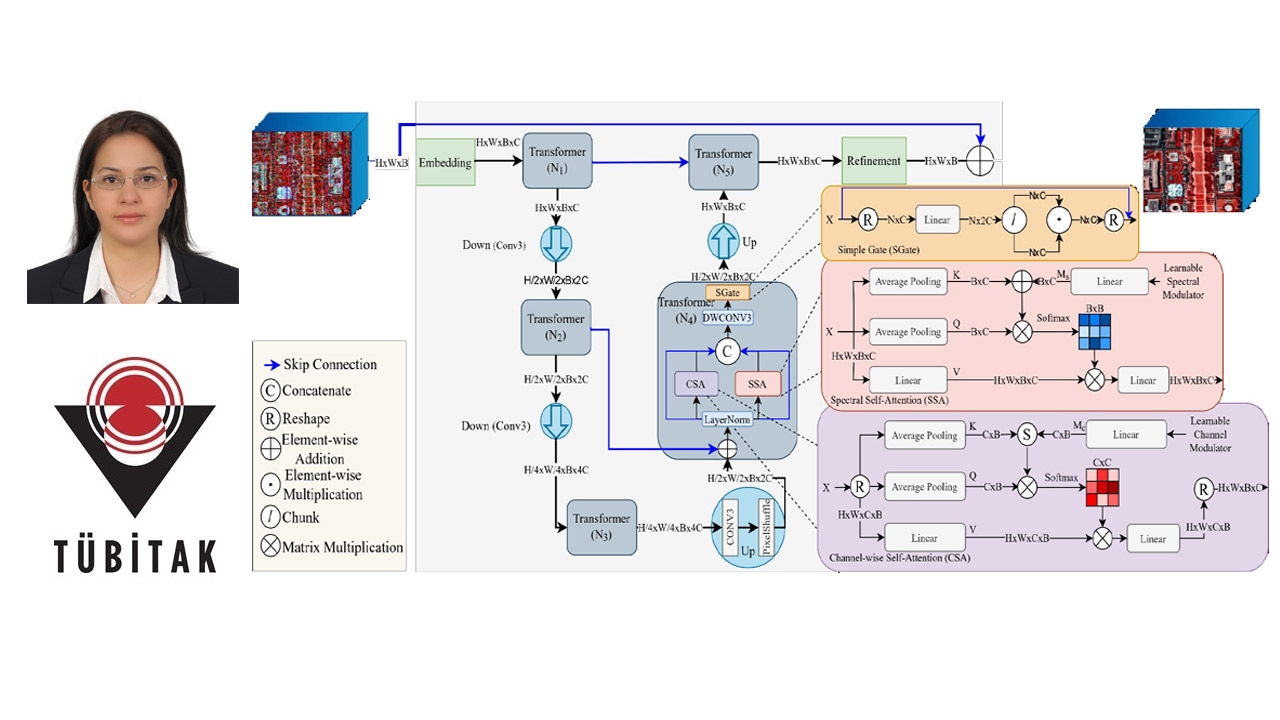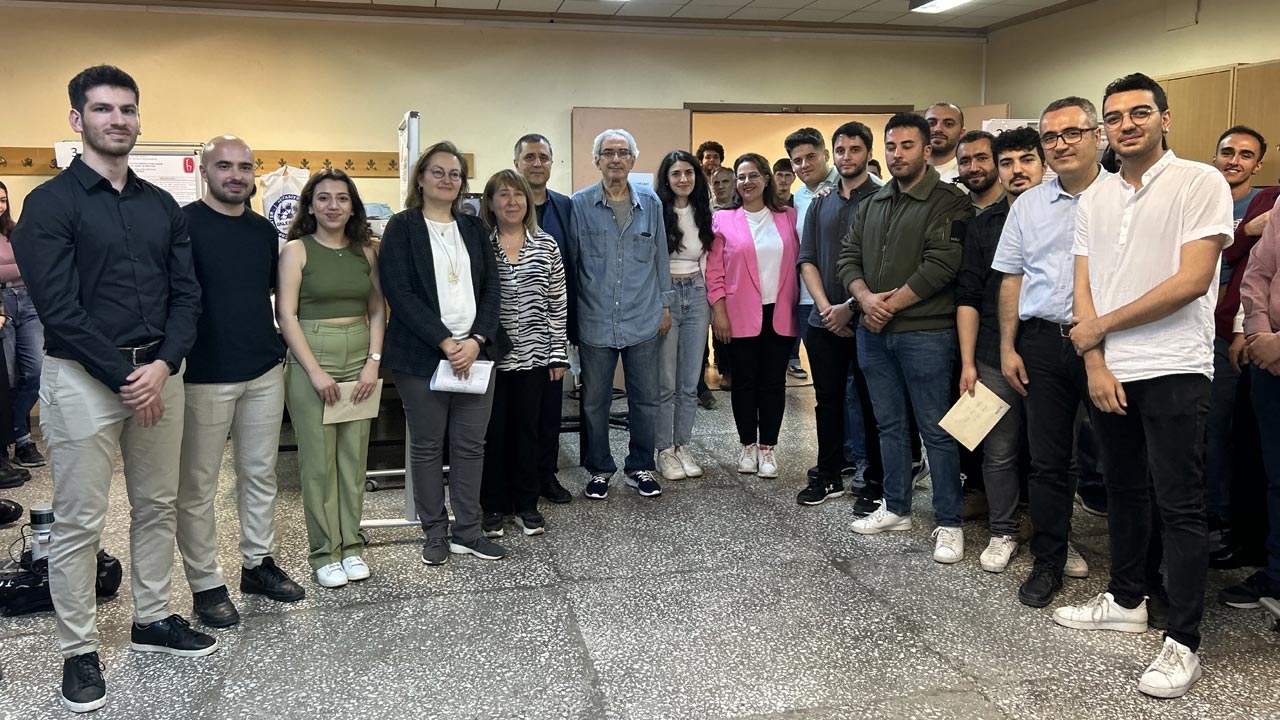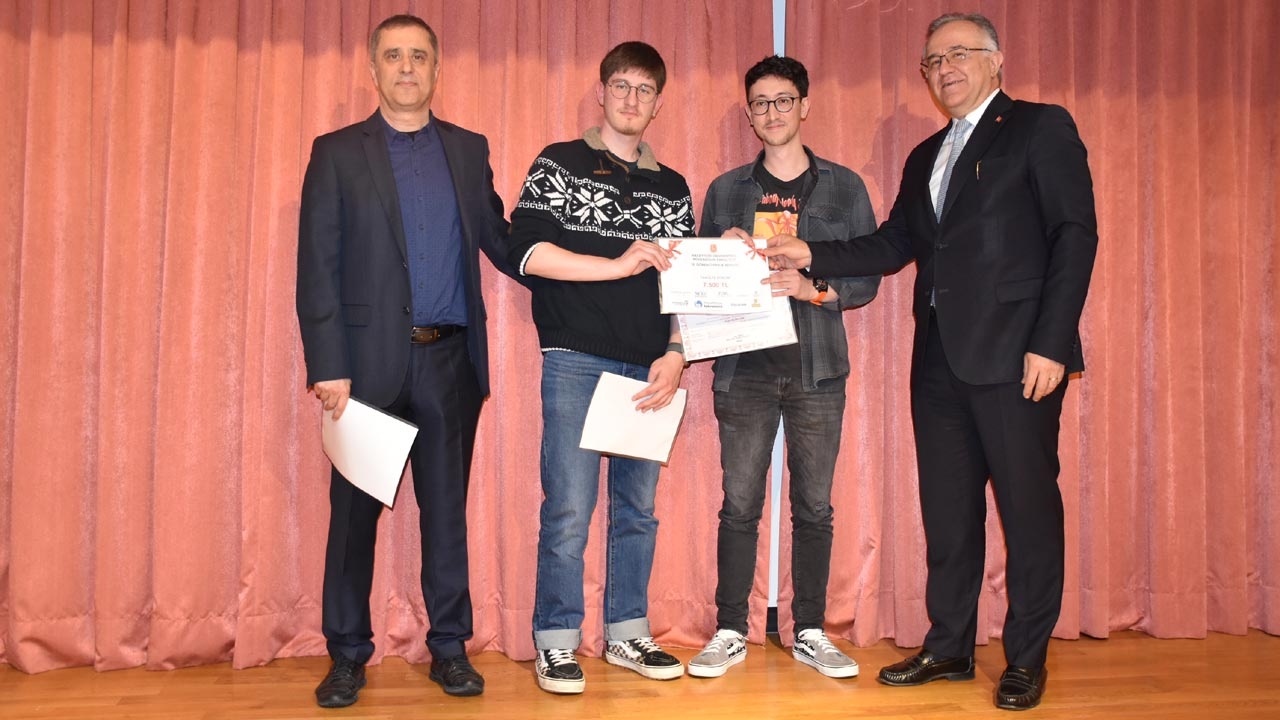Haber
ONLINE SEMİNER: Wireless Access Architecture: The Next 20+ Years, Prof. Dr. Halim Yanıkömeroğlu, 20 Ekim 2020 Salı, 17:30, Zoom
15 Ekim 2020
Hacettepe Üniversitesi Elektrik ve Elektronik Mühendisliği Bölümü tarafından gerçekleştirilen Bölüm Seminerleri kapsamında 2020-2021 Güz Dönemi ilk seminerimiz Kanada Carleton Üniversitesi'nden Prof. Dr. Halim Yanıkömeroğlu tarafından gerçekleştirilecektir. Seminer başlığı: Wireless Access Architecture: The Next 20+ Years. Kablosuz mobil haberleşme sistemleri üzerine öncü çalışmalar gerçekleştiren Prof. Yanıkömeroğlu'na seminer teklifimizi kabul ettiği için teşekkür eder, tüm ilgilenenleri seminerimize davet ederiz.
Sorularınız için:
Dr. İsmail Uyanık, uyanik@ee.hacettepe.edu.tr
Dr. Barış Yüksekkaya, barisy@ee.hacettepe.edu.tr
Seminer Tarihi : 20 Ekim 2020 Salı
Seminer Saati : 17:30
Seminer Yeri : Zoom
Zoom kodu ve şifresi görseldedir.
Sorularınız için:
Dr. İsmail Uyanık, uyanik@ee.hacettepe.edu.tr
Dr. Barış Yüksekkaya, barisy@ee.hacettepe.edu.tr
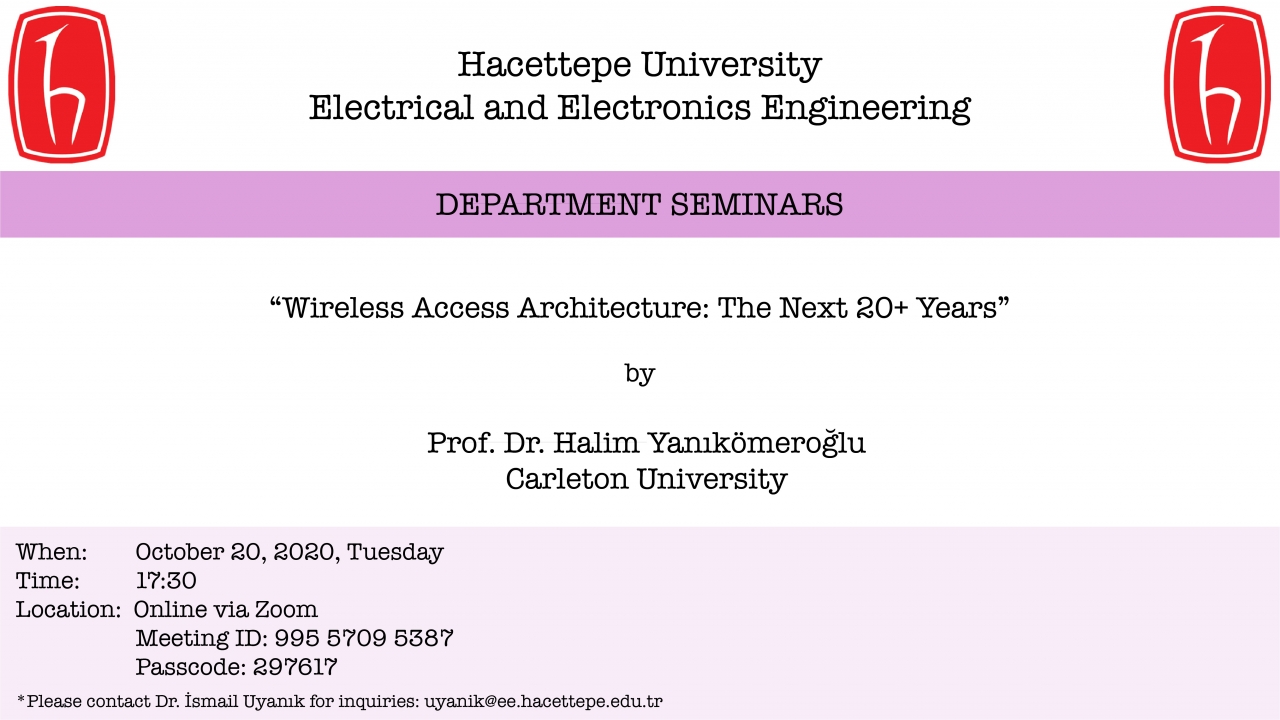
ÖZET
The very fundamental principles of digital and wireless communications reveal that the provision of ubiquitous super-connectivity in the global scale – i.e., beyond indoors, dense downtown or campus-type areas – is infeasible with the legacy terrestrial network architecture as this would require prohibitively expensive gross over-provisioning. The problem will only exacerbate with even more demanding use-cases of 2030s such as UAVs requiring connectivity (ex: delivery drones), thus the 3D super-connectivity.
The roots of today’s wireless access architecture (the terrestrial 4G & 5G cellular network) go back to 1940s. The access architecture has evolved substantially over the decades. However, rapid developments in a number of domains outside telecommunications, including those in aerospace and satellite industries as well as in artificial intelligence, will likely result in a disruptive transformation in the wireless access architecture in the next 20+ years.
In this talk, an ultra-agile, dynamic, distributed, and partly-autonomous vertical heterogeneous network (VHetNet) architecture with very low earth orbit satellites (VLEOs), high-altitude platform station (HAPS) systems, and UAV-BSs (UxNB in 3GPP terminology) for almost-ubiquitous super-connectivity will be presented. In the envisioned VHetNet architecture, the HAPS systems constitute arguably the most promising tier. For more information on HAPS systems, please refer to the below papers under review:
https://arxiv.org/abs/2007.15088
https://arxiv.org/abs/2007.08747
https://arxiv.org/abs/2009.02771
https://arxiv.org/abs/2006.09328
https://arxiv.org/abs/2009.09477
Konuşmacının Biyografisi
Halim Yanikomeroglu was born in Giresun, Turkey, in 1968. He received the BSc degree in electrical and electronics engineering from the Middle East Technical University in 1990, and the MASc and PhD degrees in electrical and computer engineering from the University of Toronto, Canada, in 1992 and 1998, respectively. Since 1998 he has been with the Department of Systems and Computer Engineering at Carleton University, Ottawa, Canada, where he is now a Full Professor. His extensive collaboration with industry on 4G & 5G wireless technologies resulted in 37 granted patents. During 2012-2016, he led one of the largest academic-industrial collaborative research programs on pre-standards 5G wireless. In Summer 2019, he started a new large-scale project on the 6G wireless network architecture. He supervised 26 PhD students (all completed with theses). He is a Fellow of IEEE, EIC (Engineering Institute of Canada), and CAE (Canadian Academy of Engineering), and a Distinguished Speaker for both IEEE Communications Society and IEEE Vehicular Technology Society. He served as the General Chair and Technical Program Chair of several major IEEE conferences, he also served in the Editorial Boards of several IEEE periodicals. He served as the Chair of IEEE Technical Committee on Personal Communications, and he is currently chairing the Steering Committee of IEEE’s flagship Wireless Communications and Networking Conference (WCNC). Dr. Yanikomeroglu received several awards for his research, teaching, and service, including the IEEE Wireless Communications Technical Committee Recognition Award in 2018 and the IEEE Vehicular Technology Society Stuart Meyer Memorial Award in 2020.
The very fundamental principles of digital and wireless communications reveal that the provision of ubiquitous super-connectivity in the global scale – i.e., beyond indoors, dense downtown or campus-type areas – is infeasible with the legacy terrestrial network architecture as this would require prohibitively expensive gross over-provisioning. The problem will only exacerbate with even more demanding use-cases of 2030s such as UAVs requiring connectivity (ex: delivery drones), thus the 3D super-connectivity.
The roots of today’s wireless access architecture (the terrestrial 4G & 5G cellular network) go back to 1940s. The access architecture has evolved substantially over the decades. However, rapid developments in a number of domains outside telecommunications, including those in aerospace and satellite industries as well as in artificial intelligence, will likely result in a disruptive transformation in the wireless access architecture in the next 20+ years.
In this talk, an ultra-agile, dynamic, distributed, and partly-autonomous vertical heterogeneous network (VHetNet) architecture with very low earth orbit satellites (VLEOs), high-altitude platform station (HAPS) systems, and UAV-BSs (UxNB in 3GPP terminology) for almost-ubiquitous super-connectivity will be presented. In the envisioned VHetNet architecture, the HAPS systems constitute arguably the most promising tier. For more information on HAPS systems, please refer to the below papers under review:
https://arxiv.org/abs/2007.15088
https://arxiv.org/abs/2007.08747
https://arxiv.org/abs/2009.02771
https://arxiv.org/abs/2006.09328
https://arxiv.org/abs/2009.09477
Konuşmacının Biyografisi
Halim Yanikomeroglu was born in Giresun, Turkey, in 1968. He received the BSc degree in electrical and electronics engineering from the Middle East Technical University in 1990, and the MASc and PhD degrees in electrical and computer engineering from the University of Toronto, Canada, in 1992 and 1998, respectively. Since 1998 he has been with the Department of Systems and Computer Engineering at Carleton University, Ottawa, Canada, where he is now a Full Professor. His extensive collaboration with industry on 4G & 5G wireless technologies resulted in 37 granted patents. During 2012-2016, he led one of the largest academic-industrial collaborative research programs on pre-standards 5G wireless. In Summer 2019, he started a new large-scale project on the 6G wireless network architecture. He supervised 26 PhD students (all completed with theses). He is a Fellow of IEEE, EIC (Engineering Institute of Canada), and CAE (Canadian Academy of Engineering), and a Distinguished Speaker for both IEEE Communications Society and IEEE Vehicular Technology Society. He served as the General Chair and Technical Program Chair of several major IEEE conferences, he also served in the Editorial Boards of several IEEE periodicals. He served as the Chair of IEEE Technical Committee on Personal Communications, and he is currently chairing the Steering Committee of IEEE’s flagship Wireless Communications and Networking Conference (WCNC). Dr. Yanikomeroglu received several awards for his research, teaching, and service, including the IEEE Wireless Communications Technical Committee Recognition Award in 2018 and the IEEE Vehicular Technology Society Stuart Meyer Memorial Award in 2020.
Diğer haberler
